Delhi High Court: In a suit filed by the plaintiffs for the grant of permanent injunction, C. Hari Shankar J.*, granted permanent injunction to the plaintiffs and restrained the defendants and others acting on their behalf from using the mark ‘dreamz11’ or any similar variant, as a trade mark, trade name, domain name, part of their e-mail ID or in any other manner. The Court also restrained Defendant 1 and 2 from using the domain name ‘dreamz11.com’ or operating the website www.dreamz11.com. The Court also directed Defendant 3 to not register the domain name ‘dreamz11.com’.
Background
In the instant case, Plaintiff 1 was the wholly owned subsidiary of Plaintiff 2, and was the registered proprietor of the trade mark ‘Dream 11’. Plaintiffs 1 and 2 were the registered proprietor of ![]() ,
,![]() ,
,![]() and
and ![]() . Further, Plaintiff 2 was the registered proprietor of the following trade mark ‘DREAM11’ and
. Further, Plaintiff 2 was the registered proprietor of the following trade mark ‘DREAM11’ and ![]() and also operated the website www.dream11.com, which was registered on 17-03-2008. Whereas, the defendants operated a website www.dreamz11.com and used the logo
and also operated the website www.dream11.com, which was registered on 17-03-2008. Whereas, the defendants operated a website www.dreamz11.com and used the logo ![]()
The plaintiff contended that the mark ‘dreamz11’ was phonetically and deceptively similar to the mark ‘dream11’ which had been registered in the plaintiff’s favour. The plaintiff also contended that the website and domain name of the defendants was also confusingly and deceptively similar to the plaintiff’s website. Further, the plaintiff alleged that the arrangement of players on plaintiff’s and defendant’s website was also similar.
A comparison of both the arrangements:
Similarly, access to the fantasy games app was also provided by the defendants, in the similar manner to that of the plaintiff. A comparison of both is as follows:
The plaintiff also submitted that the step-by-step process which was followed for downloading the defendant’s games on the defendants website was also identical to the plaintiff. Further, the defendants had also copied the plaintiff’s Facebook posts.
A comparison between the two posts is as follows:
Thus, the plaintiff addressed a notice to the defendants on 03-11-2022, and called the defendants to cease and desist from infringing the plaintiffs registered trade mark and adopted a website design and configuration which was identical or deceptively similar to the plaintiffs’. However, no response was received.
Analysis, Law, and Decision
The Court opined that the fact of the case clearly indicated infringement and passing off by the defendant. The mark ‘www.dreamz11.com’ was phonetically similar to the plaintiff’s mark www.dream11.com. The Court applied the test laid down in Re Pianotist Application, (1906) 23 RPC 774 opined that given the fact that the plaintiffs’ and defendants’ services were both accessed by persons who wanted to participate in fantasy games, there was likelihood of confusion in mind of such persons between the marks ‘dream11.com’ and ‘dreamz11.com’ and the only differences between the two marks was the letter ‘z’.
The Court opined that such confusion was further exacerbated by the look and feel of the defendants; website which had obviously, intentionally and deliberately copied the plaintiff’s website. The manner in which the respective apps was downloaded was also the same. The step-by-step guide provided on the website to avail the services of the plaintiffs and defendants were also similarly arranged. Moreover, the defendants had also copied the plaintiff’s Facebook posts.
Thus, considering the similarities between the plaintiffs’ and the defendants’ marks and that they were providing identical services, the Court opined that a clear case of infringement within Section 29(2)(b) of the Trade Marks Act, 1999 was made out.
The Court opined that the instant case also called for the invocation of triple identity test as the marks were deceptively similar, the customer base was also similar and both the marks were provided on internet websites so that they were available through the same source. The Court opined that the manner in which Defendants 1 and 2 had copied the plaintiff’s mark and adopted an identical look indicated that the defendants were consciously seeking to confuse persons into accessing the defendant’s website instead of the plaintiff. Thus, a case of passing off was also made out.
The Court opined that Defendants 1 and 2 had not chosen to respond to the present suit, which indicated that they were aware that they had no defence to lead. The Court applied the principle of non-traverse and opined that since the averments in the plaint had gone unrebutted, therefore, they were deemed to be admitted.
The Court passed a decree of permanent injunction and restrained the defendants and others acting on their behalf from using the mark ‘dreamz11’ or any similar variant, as a trade mark, trade name, domain name, part of their e-mail ID or in any other manner. The Court also restrained Defendant 1 and 2 from using the domain name ‘dreamz11.com’ or operating the website www.dreamz11.com. The Court also directed Defendant 3 to not register the domain name ‘dreamz11.com’.
[Sporta Technologies Pvt. Ltd. v. Dreamz11, 2023 SCC OnLine Del 6926, decided on 19-10-2023]
*Judgement authored by- Justice C. Hari Shankar
Advocates who appeared in this case :
For the Plaintiffs: Rohan Seth, Advocate;
For the Defendants: Tanya Choudhary, Advocate



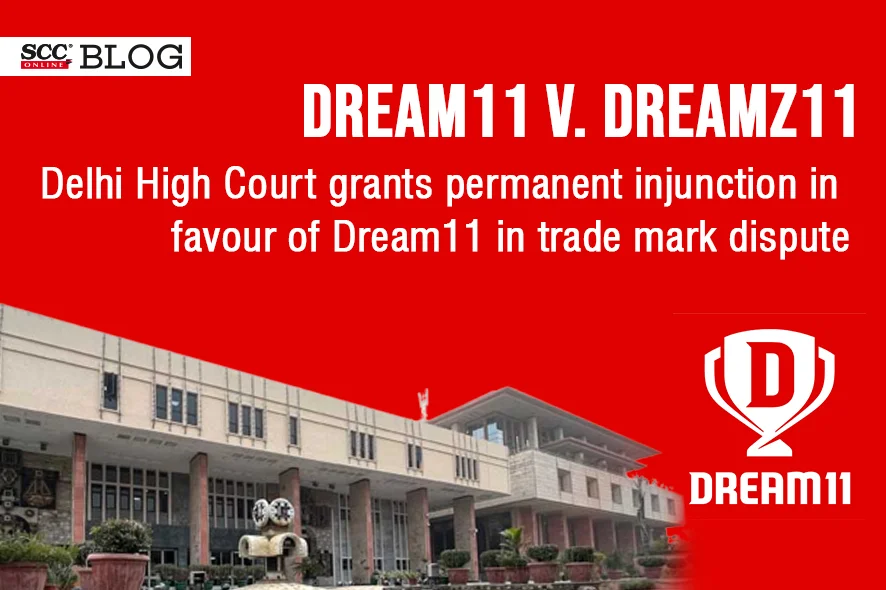
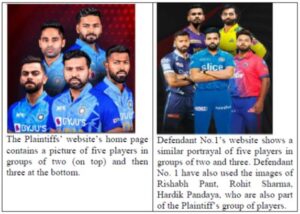

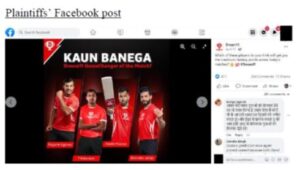
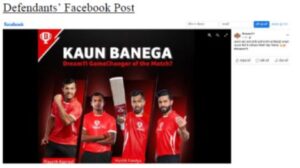
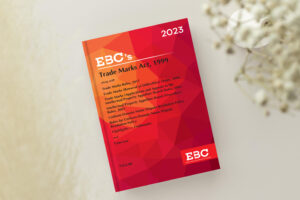




I think this decision was right because some people use small websites for dream11 prediction but people don’t know they are fake websites.